
From big to low cost shows, international adaptations of reality and entertainment formats are a go-to for TV’s prime time, as well as for new streaming services in the region. So which formats are these platforms looking for?
When analyzing the vast majority of broadcast TV networks’ programming lineups in Latin America, over the last twelve months, several time slots have been devoted to entertainment: reality shows, game shows, talk shows.
And while this genre is nothing new, it is worth noting that it has been a trend that continues to grow in terms of hours within the programming offered by the region’s platforms, which are increasingly betting on live content and the “television event”.
This proliferation of shows, which even in pandemic have remained in prime time, seems to be the future of TV in 2021. Thus, it is worth asking if this could be a new “golden era” for non-scripted content.
In February, according to a survey carried out by ttvnews, 45 international formats were on air on broadcast TV screens in Ibero-America. And the networks are already preparing new shows and new seasons for the year ahead.
There is almost no country in the region that is not currently adapting formats and Uruguay stands out because in a few years it went from being an avid consumer of finished content to one of the countries with the most adaptations.
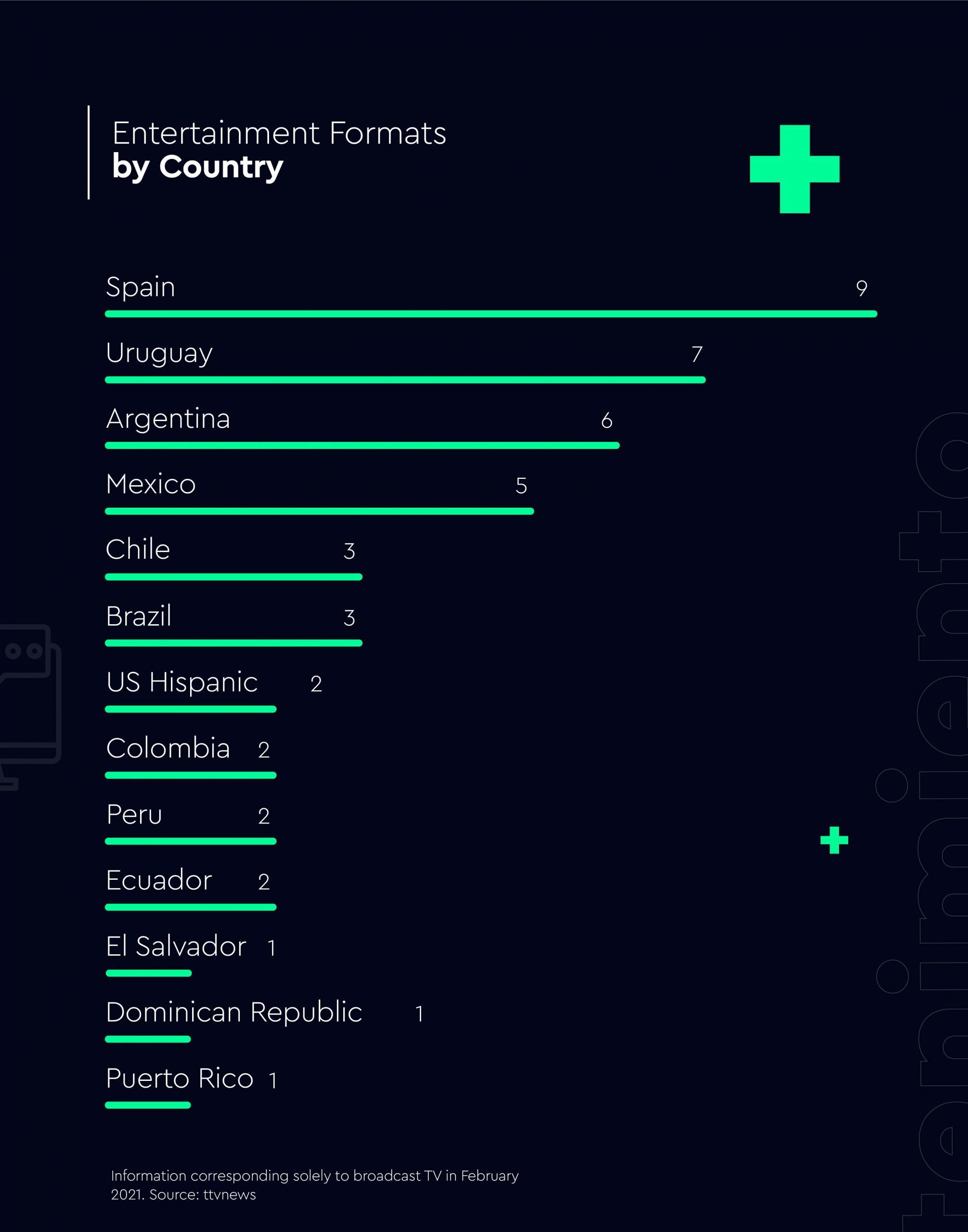
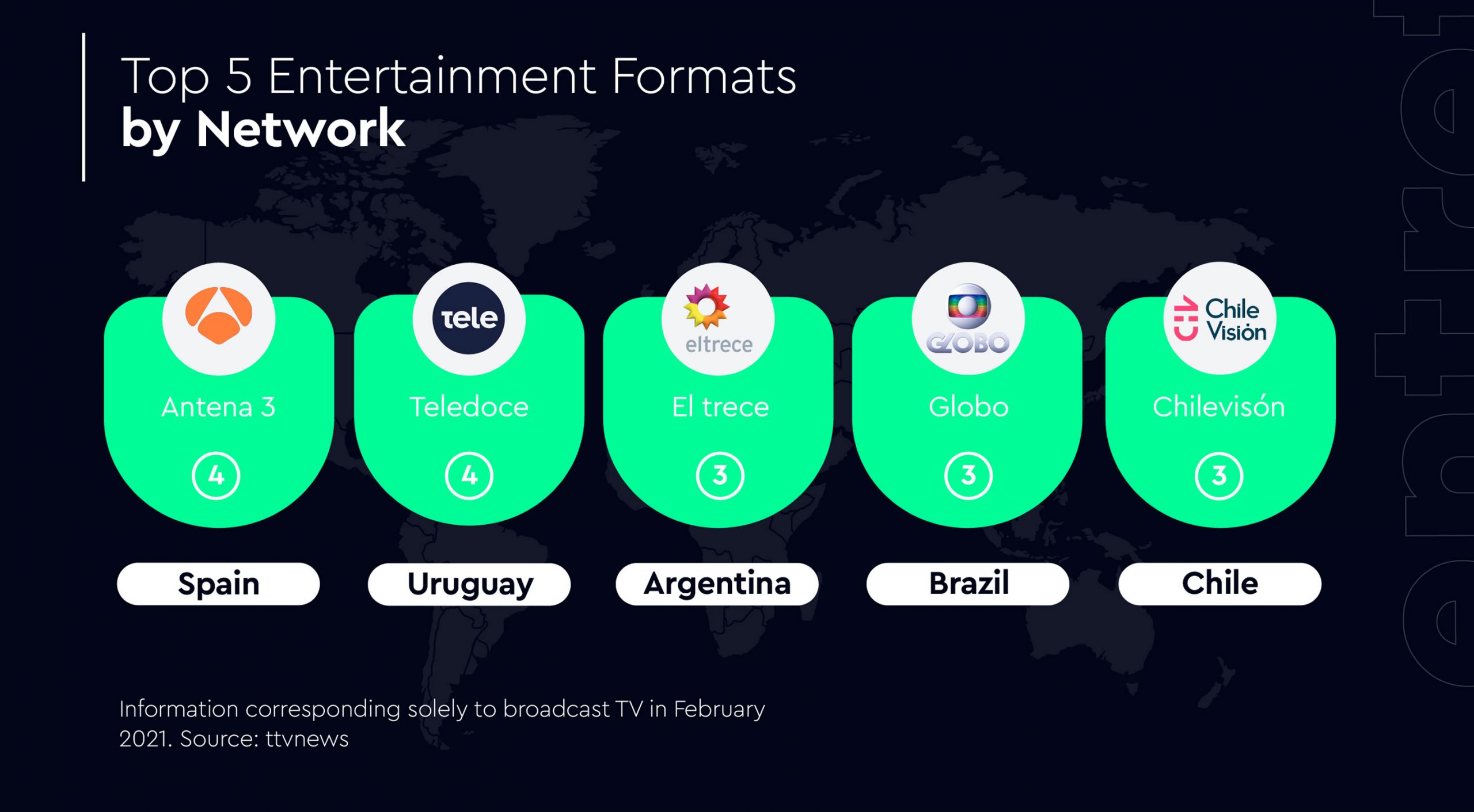
In this regard, the countries across the region are preparing new seasons of big competition shows such as Exatlón (Acun Medya) or Survivor (Banijay Rights); talent shows such as The Masked Singer (Endemol Shine Boomdog), Got Talent (Fremantle) or The Voice (Banijay Rights); cooking or game shows like MasterChef (Banijay Rights) or Who Wants to be a Millonaire? (Sony Pictures Television).
But low cost formats are also meeting the needs of TV screens in times of pandemic and social distancing, where production plans are altered and when advertisers withdraw investment on screen.
Formats such as The Wheel of Fortune (ViacomCBS) or The Big Music Quiz (Banijay Rights), are clear examples of this type of entertainment: simple, familiar, low-cost, and a valid alternative for audiences and advertisers.
Banijay Rights currently leads the market in Latin America with 20 properties, followed by ITV Global Entertainment (4), Fremantle (3), ViacomCBS (3) and Ktz Entertainment (2).
Meanwhile, Spain’s Antena 3 and Uruguay’s Teledoce stand at the top of the Top 5 of channels with more adapted formats, followed by El Trece (Argentina), Globo (Brazil) and Chilevisión (Chile) with 3, respectively.
And if analyzed by gender, talent shows lead with 8, followed by quiz shows (13), game shows (7), comedy shows (3), reality shows (2) and talk shows (2).
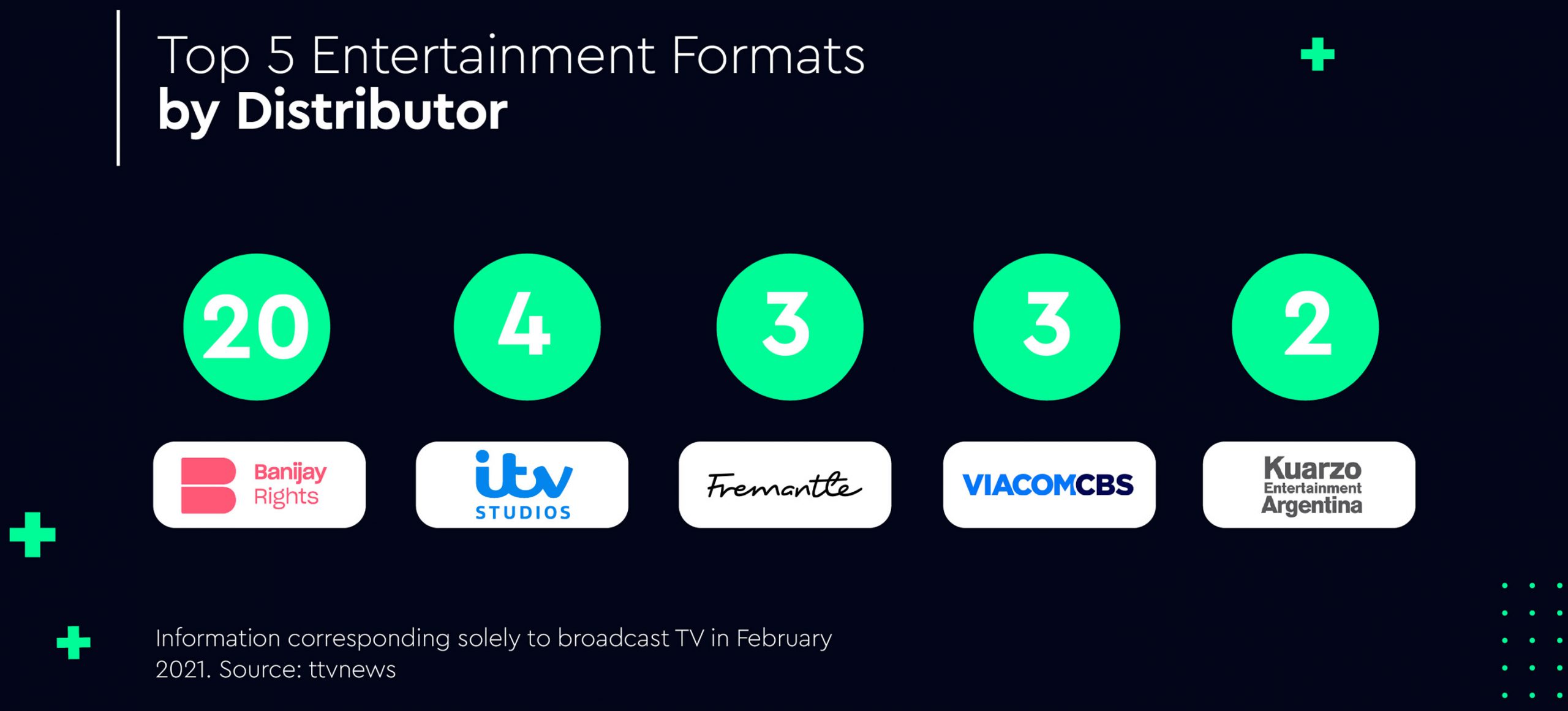
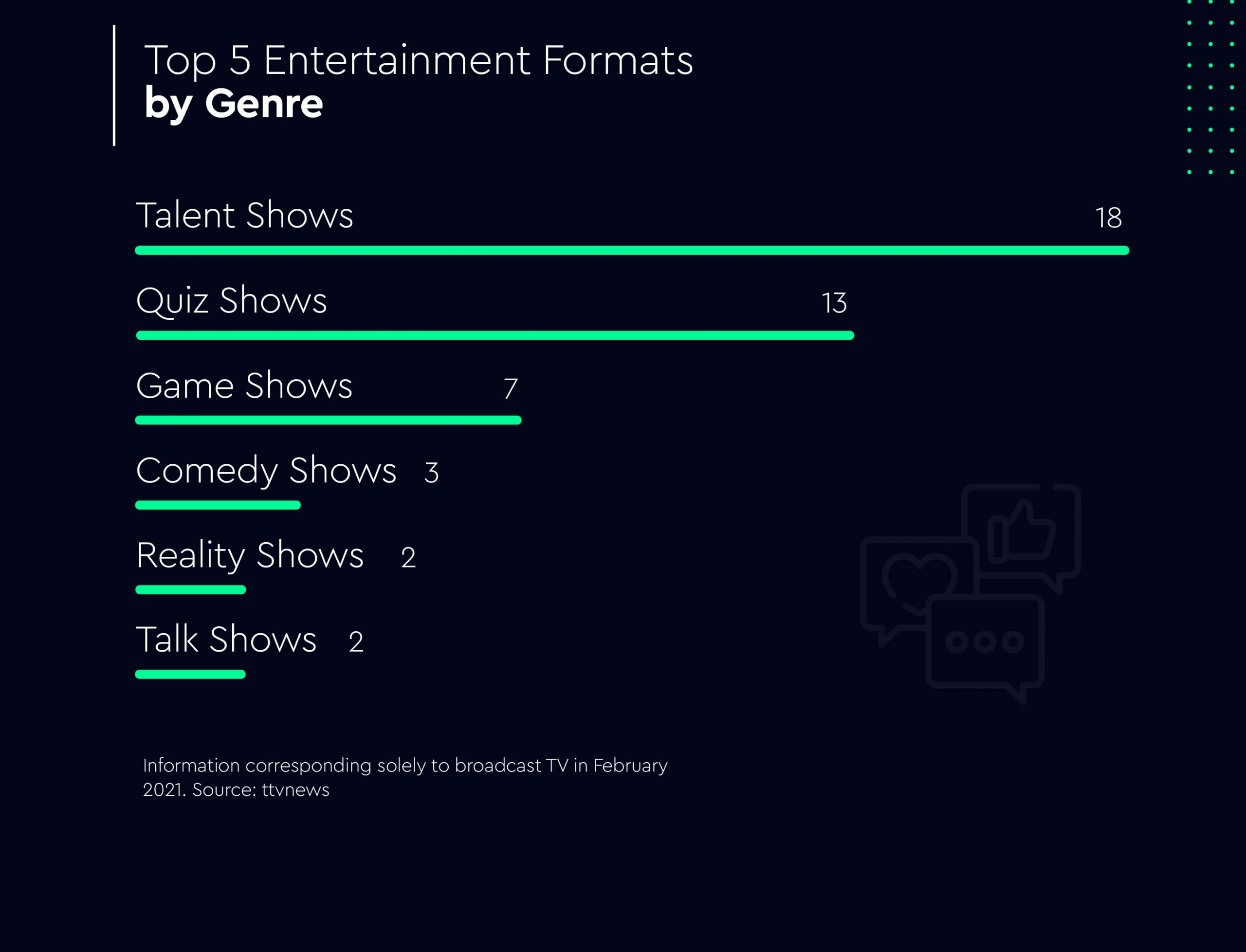
When it comes to major bets, reality competition Exatlón is a clear example of a format that has come to stay for Azteca Uno, a channel that has bet heavily on entertainment.
“Three years ago when Exatlón was not there, no one would have imagined that a high-performance competition would be in prime time of such an important channel for three hours, every day, be successful and replace fiction. Today, Exatlón has four very successful seasons. Why? Because the audience in Mexico said: this is innovative and disruptive”, said Alberto Ciurana, Director of Content and Distribution at TV Azteca.
Carmen Ferreiro, Head of Entertainment at Atresmedia, a Spanish group that has stood out for growing its commitment to entertainment year after year, with the acquisition of the main international formats such as The Voice, The Masked Singer or more recently Love Island; highlighted this trend of programming large formats in prime time.
“All the networks, unless they suddenly have a gap to fill, what they are always looking for is prime time. Large prime time formats. When it comes to Antena 3, what they like are very transversal products and formats, which may be of interest to a wide spectrum of ages,” she said.
In this regard, the executive -like Ciurana- highlighted elements such as innovation or some kind of twist in the idea as a key factor for those responsible for the entertainment of the networks.
“We are looking for formats that somehow have these elements: novelty, worthy of prime time, that it can be shared and that may interest very different age groups and profiles. In the end, everything I say is obvious, but it is difficult to find,” the executive explained.
Why is it so difficult? “It is difficult because you already know that new products appear on the market every seven or eight years. And many times at the end they are small twists on already known ideas, as in the case of The Masked Singer, which seems to be something very basic, but in the end no one had it. It is not only about how they sing, but rather guessing who is under that mask and the game that can be established with audiences, who are more participatory than ever,” she added.
Meanwhile, Latina Televisión in Peru also knew how to bet on a big show for its prime time with My Name Is (Banijay Rights).
“In the prime we changed the strategy and put on a big show. We returned with season 27 of Yo soy (My Name Is). A renewed show with great battles, a concept that was generated by Endemol and that has been widely accepted by them. Perhaps we are one of the countries that has broadcast this format the most,” explained Luis Guillermo Camacho, Strategy and Content Manager.
“We have a resounding success, positioning ourselves very close to America, sometimes beating them. We stretch it out to Saturday, with two concepts: from Monday to Friday with the big battles and the weekend with some specials that have worked very well for us”, he added.
"We look for formats that have these elements: that are new, worthy of prime time, that can be shared and that may interest very different age groups and profiles."
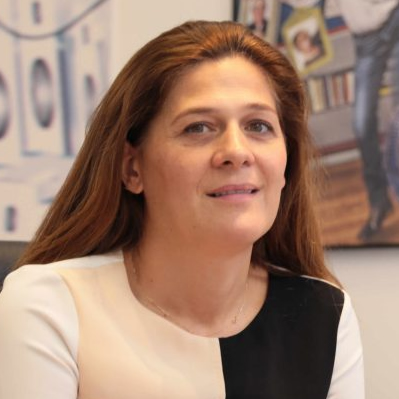
"Today, Exatlón has four very successful seasons. Why? Because the audience in Mexico said: this is innovative and disruptive."

"In Uruguay, the production of formats in prime time is being consolidated, a place previously occupied by telenovelas in many cases."
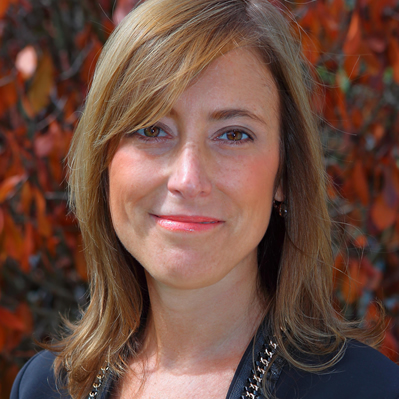
Another key element is humor, which is also presented as almost mandatory in times when audiences need to relax from everyday life.
“We hope that this trend will continue and that other light entertainment and comedy programs will also come up,” said Coty Cagliolo, Director of Production for Fremantle in Latin America, one of the largest producers of entertainment formats internationally.
In the case of RCN in Colombia, for this 2021 the channel is preparing an outstanding line up of entertainment formats, including The X Factor (Fremantle), MasterChef Celebrity (Banijay Rights) and The Masked Singer (Acun Medya).
“As our campaign says, in 2021 we go with everything, with a programming schedule aimed at the whole family. We will have entertainment products with formats that are well known to our viewers. In addition, we have Masked Singer, a world-class format that’s different from all the others,” said Eugenia Vélez, VP of Programming for Canal RCN.
For Coty Cagliolo, this trend in the evolution of entertainment formats is a consequence of the search for family content. “Audiences are turning to family and comedy entertainment, and -of course- also to the adaptability that these brands have to be produced in a pandemic situation,” said the executive.
Eugenio Restano, Programming Manager at Teledoce de Uruguay, confirmed part of this choice in a complex context as a result of the pandemic: “We had to look for some ideas that could be carried out with this new reality: with no audience, maintaining a social distance or having fewer guests on the floor; which happened to all of us in the industry”.
With this in mind, the Uruguayan channel decided on some properties with a low cost adaptation, as is the case of The Big Music Quiz (Banijay Rights), which the executive explained “is an entertaining format, very simple, light and friendly; designed for watching during the summer season, which gives the viewer the opportunity to participate as a family from home”.
In addition, he said that Teledoce is now “minimizing” acquisitions and “being very cautious and specific when looking for products, which basically means formats”, and that April will see the launch of the first Latin American adaptation of Grillmaster (Sony Pictures Television).
“The first time we did The Big Music Quiz in Latin America was in Chile with Mega and then we premiered it on Teledoce in Uruguay,” said Michelle Wasserman, Senior VP for Latin America, US Hispanic and Brazil at Banijay Rights.
“The formats not only have their momentum extended over time, but they have also been reinvented with a more flexible adaptation that allows for new spin-offs,” she said.
In this regard, the executive highlighted the peculiarities of a format of these characteristics for TV’s new reality. “It is an ideal show for these times: feel good, nostalgic and which brings the family together to escape the routine. In addition, it adapts to protocols. We are negotiating it in several Latin American countries such as Bolivia and Costa Rica,” she added.
Uruguay could be considered a case study, since in a few years the South American country went from being an avid consumer of finished content to one of the countries with the most format adaptations and, the race to choose successful properties, is growing every year.
According to the February survey, Uruguay leads the ranking of countries with 7 adaptations, after Spain, which stands on top with 9 local versions.
In this sense, in the last six years Saeta Canal 10 has bet on successful formats for its prime time, hand in hand with properties such as MasterChef or Got Talent, among others.
For Alejandro Cattaneo, general manager of Saeta Canal 10, betting on big shows is not something new. “We have done it for a long time. Got Talent is the biggest challenge we’ve ever had, but 2 or 3 years ago it was MasterChef. We are used to climbing big mountains,” he said.
“The repercussion of a product of this type goes beyond strictly linear TV; we are trending topic every Monday, the online viewing is very strong, the repercussion at the network level as well. The very characteristic of the show makes it very viral. We believe that TV has to go that way”, he emphasized.
For this 2021, the channel will bet on the local version of Who Wants to be a Millonaire? (Sony Pictures Television), a format that has already been adapted in more than 100 countries and that will have its premiere in the first half of the year.
“In Uruguay, the production of formats in prime time is being consolidated, a place previously occupied by telenovelas in many cases”, shared Patricia Daujotas, Content director at Saeta Canal 10. “It seems to me that the risk of national production is more controllable, because you do not depend on third parties. Furthermore, from a commercial point of view, brands increasingly want to insert themselves into content. And from a business point of view, domestic production is also much more interesting,” she added.
Regarding the search for innovative properties, the executive said that between 2018 and 2019 there was “a lack of new things” and now the shortage of production due to the pandemic is another key factor. “You have to go back and look at the classics,” she said.
In addition, Gustavo Landívar, general producer and Teledoce advisor, agreed, saying: “Right now in Uruguay there are many adapted international formats and that enriches the screen and the viewer ultimately wins.” For the executive, local modifications are always essential when adapting a format. “Latin TV is very different from North American and also from European. Always talking about the same format. The customs, the idiosyncrasies, the climate… There are many factors that make a difference,” he added.
Meanwhile, Ignacio Mazza, Programming Manager for Channel 4; confirmed this trend towards format adaptation. “We are facing a new stage with the channel,” he explained.
Two examples are PH: Podemos hablar (ViacomCBS) and Los 8 escalones (Ktz Entertainment Argentina), which are established as “formats that are very close to the public, where although in PH there are celebrities and in Los 8 escalones there are regular participants, in PH celebrities appear as ordinary people and share things that make them get off that pedestal and give us that feeling of closeness,” he said.
"One of the great changes that platforms have brought to our market is the return to original development. We now have the opportunity to develop tailor-made content for a very specific talent or brief."
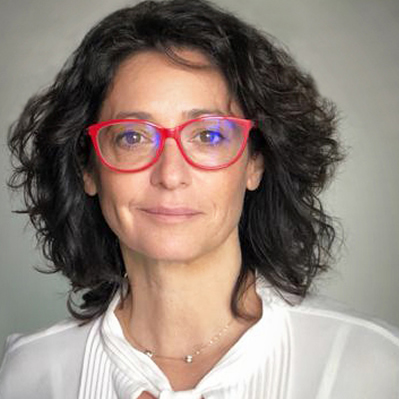
"It is not only the era of talent shows or reality shows; it is the era of concepts that last over time and that can be adapted to the new consumption habits."
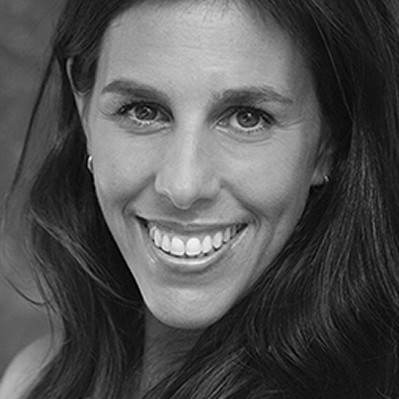
"Brazil is a strategic market for OTTs, so much so that they are targeting their franchises such as Dating Around to make Brazilian versions. And we are providing production services."

The executive believes there is no difference when opting for the adaptation of a “large” or “small” format for the channel.
“If tomorrow we believe that a very large format, such as Big Brother, is a format that can continue to bring us closer to the people, we will always choose that type of format. It seems to me that this is what makes it more interesting for the channel and also – I would encourage myself to say – for broadcast TV”, he assured.
A general idea, which also emerges from the survey, has to do with the search for “innovative” shows, since several of the formats that travel today in the region are franchises that have been around for years and broadcasters are setting their sights on new ideas coming from distributors for the 2022-2023 seasons.
In this regard, Michelle Wasserman believes innovation not only has to do with new ideas or new genres, but also with the renewal of initial concepts. “It is not only the era of talent shows or reality shows; it is the era of concepts that last over time and that can be adapted to the new consumption habits,” she said.
“Whenever a new idea arises, it will be framed in a genre or a subgenre. Before, quiz shows were about questions and answers; and music was added today. Innovation is the makeup of the initial concept”, she emphasized.
For this year Endemol Shine Boomdog, another one of the great producers of entertainment formats in the Northern Cone, announced that it is developing a new version of the game show El gran juego de la Oca; as well as a Latin American version of the world format Into The Wild With Bear Grylls.
“El gran juego de la Oca is, without a doubt, one of the most beloved game shows in history for Spanish-speaking viewers worldwide and we are thrilled to bring it back with some new and exciting changes,” said Álvaro Godoy, Development Director of Endemol Shine Boomdog.
“Into The Wild is one of the most successful non-fiction formats in the world and we are delighted to partner with Bear Grylls to produce a local version of the series,” said Alejandro Rincón, CEO of Endemol Shine Boomdog. “We are summoning some of the greatest celebrities from all of Latin America to participate in the greatest adventure of their lives,” he added.
It is not only TV that is programming entertainment formats. Pay TV channels also have their entertainment formats and two clear and successful examples are the Shark Tank properties (Canal Sony / Claro Video), which in 2021 will go for its sixth season in Mexico, and the reality show Acapulco Shore (MTV), which this year will go, also in Mexico, for its seventh season.
“From being a show with a high level of entertainment, it also has an important social element, because it motivates both the entrepreneurs in the show and the people who watch it. I think we are in a difficult moment, unprecedented both in the region and globally, where people are going to need to use all their creativity to get ahead,” said Ramón García, Senior VP of Distribution and Channels at Sony Pictures Television in Mexico, while confirming that the show will return in 2021.
But without a doubt, one of the newest trends in this regard revolves around streaming platforms, which are commissioning this type of content in the region.
“One of the big changes that platforms have brought to our market is the return to original development. We now have the opportunity to develop tailor-made content for a very specific talent or brief,” said Coty Cagliolo.
“For all of us with a creative background this is a great time to re-develop entertainment. In my opinion, this stage is going to have a very positive effect on the future of the audiovisual industry in our region,” she added.
Moreover, Michelle Wasserman agreed with Cagliolo, saying: “It’s not that the entertainment format has a golden moment, but that it has evolved with TV, multiplatform and consumer habits. Non-scripted entertainment has been a protagonist on screens for a long time and is slowly gaining ground on other non-traditional, non-linear screens”.
For example, Netflix announced unscripted original productions in Brazil, including four reality shows: Queer Eye Brasil, produced by Floresta Produções (Sony Pictures Television); Casamento às Cegas, a local adaptation of Love is Blind; Jumping with Fogo, produced by Fremantle; and one on entrepreneurship (still untitled), also produced by Floresta Produções.
With the development of these new titles, the platform expands its original programming offer in a segment made up of reality shows, entertainment programs and documentaries, on which it is betting more and more.
“Brazil is a strategic market for OTTs, so much so that they are targeting their franchises like Dating Around to make Brazilian versions. And we are providing production services”, explained Juliana Algañaraz, CEO of Endemol Shine Brasil.
The Brazilian production company develops entertainment formats, including The Wall (Globo), All Together Now (Record TV) -nominated for the 2020 International Emmy- and its version All Together Now Kids or Dating Around for Netflix.
“We are the only production company in Brazil that today works for the five TV channels, for all OTTs, for cable channels – a little less now – and also for sponsors and digital platforms such as Facebook, YouTube, Twitter, even Pinterest”, highlighted the executive.
In this regard, the British format Game of Clones added its first version in Latin America, with the adaptation of the dating show in Brazil, produced by Endemol Shine Brazil under the name Game dos Clones for Amazon Prime Video and Record TV.
And Floresta Produções is already producing the second season of the reality show Soltos em Floripa for Amazon Prime Video that debuted on February 12.
In addition, Netflix announced Insiders, its first reality show from and for Spain. It is an original format that will be produced by iZen, a group to which Zebra Producciones and Boca a Boca belong, and which will give away a prize of 100,000 euros.
“We are very proud to undertake this project together with iZen. We are excited about the possibility of experimenting with a new genre for us in Spain and continuing to innovate with an entertainment format created here,” said Álvaro Díaz, Director of Non-Fiction Content at Netflix.
Insiders thus becomes the first reality show that Netflix produces in Spain and will join the service’s reality show offering such as The Circle, Love is Blind or more recently, Too Hot To Handle, among others.
